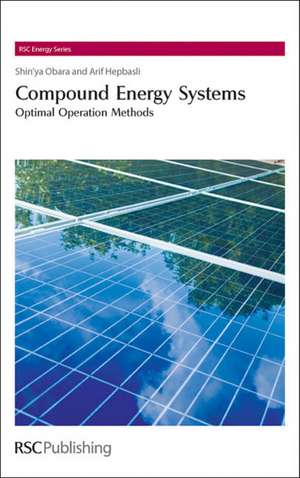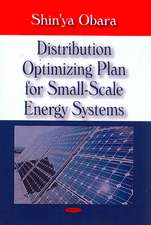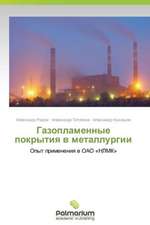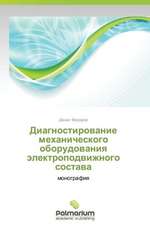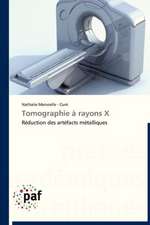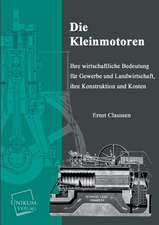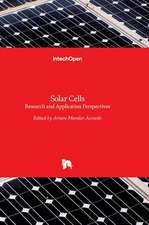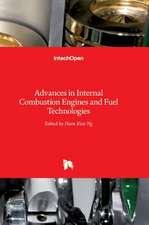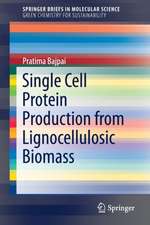Compound Energy Systems: Optimal Operation Methods: RSC Energy, cartea 3
Autor Arif Hepbasli, Shin'ya Obaraen Limba Engleză Hardback – 31 iul 2010
This book, a distillation of information only touched upon in other books, is aimed at undergraduate and postgraduate students, scientists, engineers and industrialists with an interest in the field.
Preț: 946.58 lei
Preț vechi: 1100.67 lei
-14% Nou
Puncte Express: 1420
Preț estimativ în valută:
181.19€ • 196.87$ • 152.29£
181.19€ • 196.87$ • 152.29£
Carte tipărită la comandă
Livrare economică 21 aprilie-05 mai
Preluare comenzi: 021 569.72.76
Specificații
ISBN-13: 9781849730310
ISBN-10: 1849730318
Pagini: 268
Ilustrații: 1
Dimensiuni: 157 x 236 x 20 mm
Greutate: 0.54 kg
Ediția:Edition.
Editura: Royal Society Of Chemistry
Seriile RSC Energy Series, RSC Energy
ISBN-10: 1849730318
Pagini: 268
Ilustrații: 1
Dimensiuni: 157 x 236 x 20 mm
Greutate: 0.54 kg
Ediția:Edition.
Editura: Royal Society Of Chemistry
Seriile RSC Energy Series, RSC Energy
Cuprins
Chapter 1: Background; Chapter 2: Operation Analysis of a Compound Energy System -Exhaust Heat Use Plan when Connecting Solar Modules to a Fuel Cell Network; Chapter 3: Operation of Compound Energy System -Fuel Cell Network System Considering Reduction in Fuel Cell Capacity; Chapter 4: Power Independent House Using PEFC -Operation Plan of a Combined Fuel Cell Cogeneration, Solar Module, and Geo-Thermal Heat Pump System; Chapter 5: PEFC / Engine Generator Compound Energy System (1) -CO2 Discharge Characteristic of PEFC / Hydrogen-Gas-Engine Hybrid Cogeneration; Chapter 6: PEFC / Engine Generator Compound Energy System (2) -Power Generation Efficiency of an Independent Microgrid Composed of Distributed Engine Generators; Chapter 7: PEFC / Green Energy Compound System (1) -Operation Planning of a PEFC and Photovoltaics with Prediction of Electricity Production Using GA and Numerical Weather Information; Chapter 8: PEFC / Green Energy Compound System (2) -Overall Efficiency of a PEFC with a Bioethanol Solar Reforming System for Individual Houses; Chapter 9: PEFC / Green Energy Compound System (3) -Fuel Cell microgrid with Wind Power Generation; Chapter 10: Solar Cell / Diesel Engine Compound System with Production-of-Electricity Prediction; Chapter 11: Dynamic Characteristics of Power for PEFC Compound System; Chapter 12: Performance Analysis and Assessment of Compound Energy Systems Using Exergy Analysis Method
Notă biografică
Shin'ya Obara is a Professor of Department of Electrical and Electronic Engineering at Kitami Institute of University, Hokaido, Japan. He received B.S. in mechanical engineering from Nagaoka University of Technology, Japan in 1987, M.S. in mechanical system from Nagaoka University of Technology, in 1989 and a Ph.D. in mechanical science from Hokkaido University in 2000, while he was working in companies and academic organizations. He worked as a researcher in Department of Mechanical Science of Hokkaido University from 2000-2001. Dr. Shin'ya Obara joined Tomakomai National College of Technology in 2001 after an eight-year period in industry (as engineer and assistant manager for researches, in two different companies, namely Takasago Thermal Engineering Co., Ltd. and Aisin AW Co., Ltd. in Japan). He was associate professor of Department of Mechanical Engineering of Tomakomai National College between 2001-2007. Moreover, he was professor of Department of Mechanical Engineering of Tomakomai National College in 2008 and Professor of Department of Electrical and Electronic Engineering at Kitami Institute of Technology between 2008 to data. His research has been involved with power and heat energy and operation optimization analyses of energy compound systems and energy efficiency, microgrid technology, energy network system with renewable energy sources. Dr. Obara is author and co-author of over 90 papers on a national and international journal. Arif Hepbasli, having the work life philosophy which is to attain Industry (I), Profession Institutions (P) and University (U), Balanced IPU simultaneously, is a Full Professor of Mechanical Engineering at Ege University, Izmir, Turkey. He received B.S. (first class honor) in mechanical engineering from Selcuk University (SU), Turkey in 1980, M.S. from Istanbul Technical University of Istanbul (studied one year at the German-Preparation Class of Institution of Higher Education for Foreign Languages, Technical University of Istanbul), Turkey in 1985 and a Ph.D. in mechanical engineering from Selcuk University in 1990, while he was working in industry. He worked as a research assistant in ME Department of Selcuk University from 1982-1986. Dr. Hepbasli joined Ege University in 1996 after a ten-year period in industry (as head engineer, assistant manager for investments and maintenance manager, in three different companies, namely DESA Combustion Systems Manufacturer, AKZO-KEMIPOL Paint Factory and SIMPLOT & BESIKCIOGLU French-fried Processor in Izmir) and a one-year period at Izmir Branch Office of Chamber of Mechanical Engineers as a consultant. He was Vice Director of Solar Energy Institute of Ege University between 1997-2000 and EBILTEM (Ege University Science Technology Application and Research Center) between 2000-2001. His research has been involved with energy, exergy and exergoeconomic analyses of energy systems, energy efficiency and management, fluidized bed combustion systems, ground-source heat pumps, and utilization and potential of renewable energy sources. Dr. Hepbasli is the first Certified Industrial Energy Manager of Turkey (having a certificate from JICA, Japan) as a university lecturer, while he is author and co-author of over 320 papers on a national and international basis. He has chaired and co-chaired many national and international conferences, symposia, workshops and technical meetings. He worked as a Visiting Professor between 2004-2005 at the University of Ontario Institute of Technology in Canada. He has served as a consultant in cases involving his research area and is also a member in the International Advisory Board of five journals on the SCI basis, namely "Energy Sources (Taylor & Francis)", "International Journal of Green Energy", "International Journal of Energy Research (Wiley)", "International Journal of Exergy" and "Energy and Buildings (Elsevier) ".
Textul de pe ultima copertă
Green energy is essential to the development of a sustainable society but its output can be unstable. It is therefore necessary to develop a network where both conventional and green energy systems cooperate to generate a stable, compound supply. Compound Energy Systems: Optimal Operation Methods describes the construction and operation of compound energy systems using the latest optimization methods. The authors examine the combination of traditional and alternative energy systems, which is becoming an increasingly popular solution to green energy. Important factors such as cost, efficiency and dynamic characteristics are all considered. The green energy sources discussed include fuel cells, bioethanol reformers, geo-thermal heat pumps, solar cells and wind power. This book, a distillation of information only touched upon in other books, is aimed at undergraduate and postgraduate students, scientists, engineers and industrialists with an interest in the field.
Descriere
This book, a distillation of information only touched upon in other books, is aimed at undergraduate and postgraduate students, scientists, engineers and industrialists with an interest in the field.
